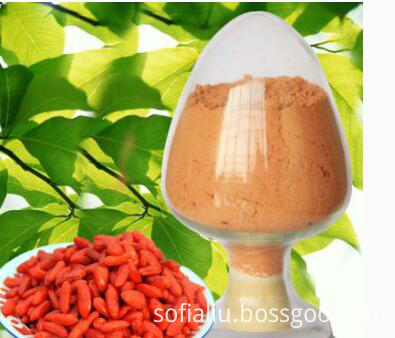Lycium sweet
nature, Ping, owned by the liver and kidney, with nourishing liver and
kidney, Liver eyesight effect, often with Rehmannia, chrysanthemum, yam,
cornus and other drugs with the use. Modern
medical research shows that it contains the carotene, betaine, vitamin
A, vitamin B1, vitamin B2, vitamin C and calcium, phosphorus, iron,
etc., with increased white blood cell activity and promote hepatocyte
regeneration pharmacological effects of modern pharmacological
experiments show that: Wolfberry has enhanced
immune function, inhibition of tumor, lowering blood sugar,
lipid-lowering, anti-fatigue and other functions. "Materia
Medica remarks," that medlar can make "gas can be filled, blood can
make up, Yang can be health, Yin can be long, rheumatoid can go, there
are ten wonderful Yan." In the "Compendium of Materia Medica," the main
Chinese wolfberry Efficacy summarized as "Kidney, lungs, eyesight," concise, in line with reality. Kidney
Yin deficiency, lack of liver blood, causing Yaoxisuanruan, dizziness,
tinnitus, nocturnal emission embolism, should use medlar.
Please feel free to leave us message.
Product Name
Country of Origin
Ningxia in China
ANALYSIS
SPECIFICATTION
TEST METHODS
Product Name
FD Goji Powder
SD Goji Powder
Color
Orange-yellow or Orange-red
Organoleptic Inspection
Odor
Characteristic, no other odor
Organoleptic Inspection
Taste
Characteristic
Organoleptic Inspection
Characters/Appearance
Fine particles or powder, slightly caking
Organoleptic Inspection
Impurity
No visible foreign material
Organoleptic Inspection
Loss on drying/Moisture(%)
NMT 10.0
NMT 8.0
GB5009.3
Total Sugar(glucose%)
NLT 40.0
NLT 20.0
GB/T18672
Protein(%)
NLT 4.0
NLT 4.0
GB5009.3
Leads(Pb) mg/kg
NMT 0.5
NMT 1.0
GB5009.12
Arsenic(As) mg/kg
NMT 0.3
NMT 0.5
GB/T5009.11
Total Plate Count(cfu/g)
NMT 30000
GB4789.2
Coliform(MPN/100g)
NMT 90
NMT 30
GB4789.3
Mold(cfu/g)
NMT 25
NMT 20
GB4789.15
Yeast(cfu/g)
NMT 25
NMT 20
GB4789.15
Pathogen
Negative
GB4789.4, GB4789.5, GB4789.10, GB/T4789.11
Shelf Life
12 months if stored in a cool ventilated dry place
Storage
It should be stored under cool, well ventilated, and dry condition
Package
Internal: Double composite bag. External: Carton
Goji Powder Herbal Goji Berry,Wolfberry Powder,Goji Berry Extract Powder,Goji Berry Freeze Dried Powder Ningxia Wolfberry Goji Industry Co.,ltd , https://www.nx-wolfberry.com
(2) The pathogenic bacteria and the occurrence rule are Phytophthora spp. belonging to the fungus Subgenie fungus. The optimum temperature for the development of pathogens is 24-28 degrees Celsius, the highest 32 °C, the lowest 8 °C. Generally low temperature is beneficial to the growth and development of pathogenic bacteria.
(3) Prevention and cure methods 1 Do a good job of seed bed disinfection. The treatment of bed soil at 50 degrees Celsius for 10 minutes can greatly reduce the incidence rate. Green earthworm No. 1 (Stachypythroside, Hymexazol) and other drugs can also be used for bed soil treatment.
2 Soil application of biological fertilizers. Fertilizers, fertilisers and other biological fertilizers are applied to the soil.
3 Using disease-resistant rootstocks, such as Yunnan black-skinned squash and Liaowu No. 1.
4 drug control, the early onset of 50% benomyl WP 1500 times Irrigation roots, each medicinal liquid 250mm.

Any inquiry would be replied within 2 hours on working days!
Production Specification Sheet
Grafting cucumber root rot and its prevention
(1) Incidence of symptoms after the onset of symptoms. The course of disease is longer, and the wilting of the leaves begins during the day and can be restored at night or on a cloudy day. After a few days, the lower leaves begin to yellow and gradually develop upwards, resulting in dysplastic growth. There are two kinds of above-mentioned situations: First, grafted seedlings belong to the black stem pumpkin parts of the stem near the ground water stains become brown and corrupt, resulting in the death of the whole plant; Second, the stem base does not appear water and spoilage symptoms, pumpkin and cucumber The vascular bundles were also not browned. The roots of the excavated roots showed that the roots of the fine roots were brown and rot. Some of the main roots and branch roots also appeared light brown to brown. In severe cases, all the roots became brown and dark brown, and all of the bases of the fine roots were longitudinally split. And in the middle of the longitudinal cracks may be found in gray and black bands of mycelium, in the root bark cells can be seen dense black spots.